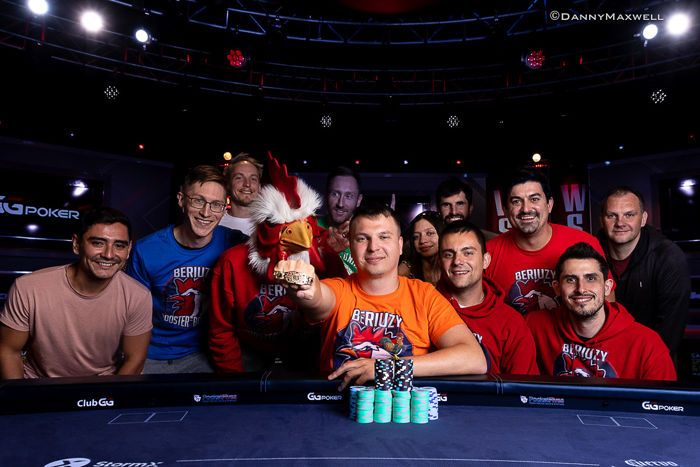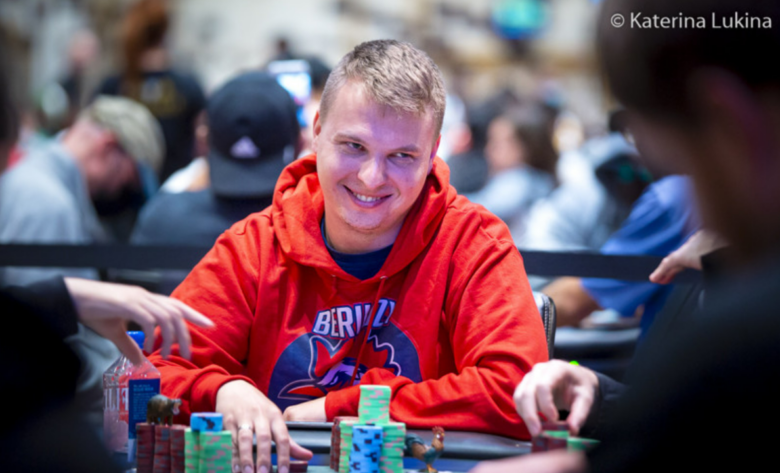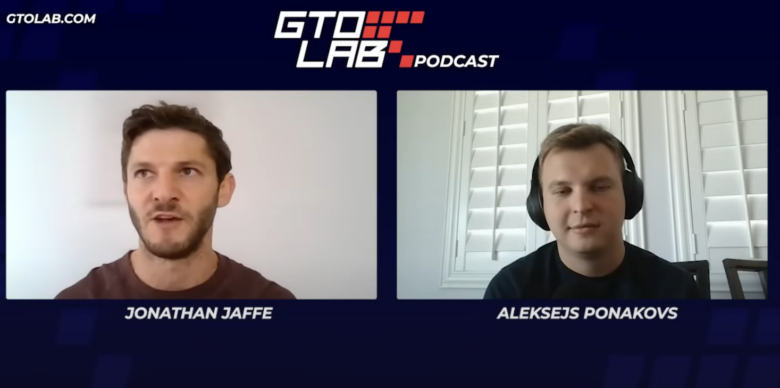Strategic Tips from Aleksejs Ponakovs

Recommended Poker Sites – Editor’s Pick
Although the US is considered the Mecca of poker, Europe is just as rich with poker talent. One of them is Latvian poker super-pro Aleksejs Ponakovs, who opened to the poker community in July 2024 during Jonathan Jaffe’s “GTO Lab” podcast.
We chose some thoughts and ideas from the podcast to retell. While we’re reporting on the best of them, we still strongly recommend you watch the entire conversation on YouTube.
Who is Aleksejs Ponakovs?
Aleksejs Ponakovs is a professional high stakes poker player with more than $2 million in online and $18,7 million of total live earnings won between 2007 and 2024.
He first started playing regularly in the early 2000s, moving to live poker in 2010s:
“I think I started playing poker in 2007. I was slightly under 18 but very interested in this game. I was playing Counter Strike professionally and a lot of my friends were like: “You know. there is such a game as poker it’s kind of… it’s not free money but there is an option to win some money”. And I was like: “Oh, that’s cool!” because we were not actually earning a lot of money by playing Counter Strike.
I was kind of young, I definitely don’t need money at this age but everyone are excited to earn something because you can imagine what type of expenses you can have while you’re young.”
At first, Ponakovs tried to combine university studies and a semi-professional poker career but soon realized that he needed to choose between studying, sleeping and playing poker. As a result, his academic career was left behind.
As of July 2024, Ponakovs’ five biggest ITMs in live poker are:
| Place | Year | Event | Prize |
|---|---|---|---|
| 3rd | 2024 | $132,5K Main Event Triton Poker Super High Roller Series Montenegro | $2,200,000 |
| 4th | 2023 | $262,5K Luxon Invitational Triton Poker Super High Roller Series London | $2,540,000 |
| 6th | 2023 | $212K NLH – 8-Handed Triton Poker Super High Roller Series London | $970,000 |
| 6th | 2022 | $200K Coin Rivet Invitational Triton Poker Super High Roller Series Cyprus | $1,350,000 |
| 1st | 2022 | $100K High Roller 8-Handed WSOP | $1,897,363 |
Ponakovs also won a WSOP Online 2021 bracelet in $7,777 NLH – Lucky 7’s High Roller, taking home a $432,491 prize.
In 2022, Ponakovs became one of the most notable WSOP winners, thanks to him defeating Phil Ivey in heads-up and his colorful rail with Rayan “Beriuzy” Chamas and a support team of “roosters”.
What Helps Players Rise To The Top?
Here, Ponakovs’ opinion deviates from a “praise the mighty GTO” one. Since he started his career without solvers, becoming a sort of solver by himself — i.e. manually doing the math to calculate fold equity and the like — he sees witt as one of the core traits for top poker players today:
“I actually think, there’s a higher chance that someone will be at the top of the mountain as a poker player if he ever played street poker. He can figure out in the spots that he never saw before how to play correctly or at least what he thinks is correct play.
I know a lot of players that are very solver-based. They never had this experience of just trying to figure out themselves what’s the best play. So, they will have issues if, let’s say, I will put them into the lines they never studied. I think it’s still a very important part of the game right now.”
Why Ponakovs Loves High Stakes Ecosystem?
Ponakovs considers the atmosphere on the highest level of poker wonderful since it’s very different from other layers:
“I really love the ecosystem we have in high stakes poker. We can take all these problems — and we can talk. Take all these judgments — and be okay with that and still be friends.


There’s so little chance on high stakes that you will be scammed by some of the other players. In a way related to money or life things, what I hear from what’s happening on mid-stakes or just in other businesses — it’s just insane. So, yeah — we have a very honest ecosystem.”
Photo Credit: Danny Maxwell
How To Find Exploits: Ponakovs’ Method
Only few players notice and extract exploits thanks to innate high sense of perception and attentiveness. But it doesn’t mean others can’t evolve it too — and Aleksejs has simple tactics that can help with that.
First of all, you need to start with analyzing images both yours and opponent’s:
“You work on your own expectations about your opponent and his expectations about your actual range. There is always real range and imaginary range and definitely you need to know your image very well before playing against some other high stakes player.
But sometimes you are meeting new players that probably have no idea who you are. And you have no idea who they are. So, you need to kind of try to be super precise of what they’re doing incorrectly based on your knowledge.
So, let’s say, you know — something is theoretically incorrect in their play and you’re trying to figure out how you can use that in your game. [For that] you need to be super concentrated on the less-GTO players at your table, you should use it to figure out what ideas you can find and how to exploit them.”
The next step is adjusting your betting strategy to gain value from others’ mistakes:
“If you’re not sure if someone at your table is a strong or weak player — and he probably has no idea who you are too — it’s a higher chance he will be making some kind of mistake. And there are a lot of spots where you need to construct your betting strategy on a turn, for example, only using big size or check. You can start using multiple sizes based on your hand strength — just because you expect that your opponent will not be able to punish you.
So, let’s say there’s like some kind of strong second pair that should be checking back on a turn or using only big size but you know — if you’re using big size, your opponent is not calling weaker hands. So you are just decreasing size and still betting your combination. This is a pretty simple exploit and your opponent probably will not be able to start check-raising you. Obviously, this trick will not work on high stakes — everyone will punish you for that — but talking about some midstakes tournaments — it’s very efficient there.”
Finally, you should accumulate experience of playing against different types of players to understand variations of their behavior:
“I think, in general, having experience playing against different types of opponents is very important. Even though sometimes playing high stakes you can meet players that are from that type of player category.
Talking to a lot of players who are weaker and might be recreationalists is also very important to understand the way they think. It helps a lot when you are trying to deviate your strategy from GTO.”
How To Separate Instinct From Bias?
Intuition, hunch, or that gut feeling, call it what you want, it’s still an important part of becoming a professional player, because evolution in this sense is based on gaining experience and knowledge.
Unfortunately, people often unwillingly spice them with bias, treating their stereotypes, common sense and prejudice like valuable and solid sources of motivation and reasoning.
However, Ponakovs thinks that you do not need to worry about that — just be cautious and focused on questioning your decisions:
“I think, it’s way better if you have some kind of expectations, and you go for it, and you are wrong rather than you have some kind of expectations and you’re scared to make a move. I think you need to be fair to yourself.
Let’s say, if you expect your opponent to be super overfolding on a river and you decide: “Okay, I’m going for a crazy overbluff” — you need to ask yourself, how thin you will go for value. So, if your opponent is significantly overfolding and you still value betting your like top pair top kicker, and you’re bluffing maybe second pair — something is wrong.
So, you need to be fair to yourself — what you would do with your value part of the range and what you will do with your bluffing part of the range.”
He also recommends to separate yourself from emotional reactions before making any decisions:
“It’s still fine to take results into consideration, I think, but you need to take away the emotional part of that. Because sometimes you have a few assumptions and you are completely wrong and then you just like: “but maybe he had a bad day and like next 99% of the time he will play what I was expecting but today he just had a bad day and that’s why he played this way”. No, you should take your mistakes, you should leave with them, and make a new analysis for the next day for the next spot against that type of opponent.”







